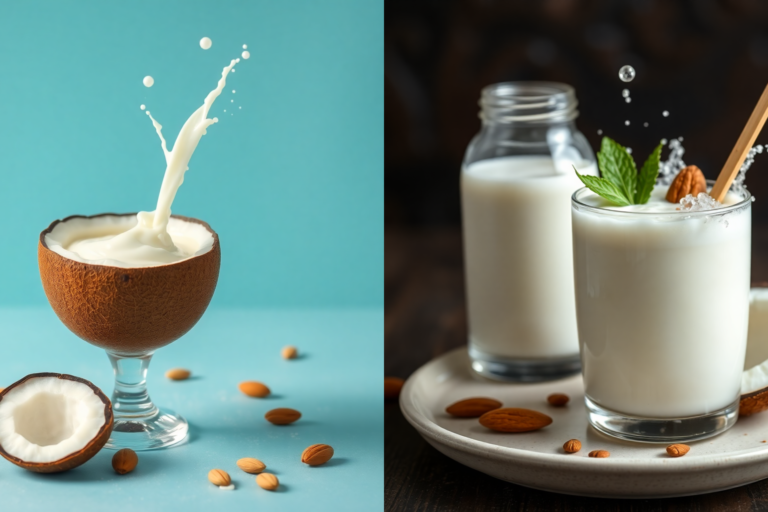Introduction of Coconut milk vs Almond milk
Introduction to Dairy Alternatives: As more individuals explore dairy-free options, the popularity of coconut milk vs almond milk has surged. These alternatives offer a lactose-free, plant-based option suitable for various dietary preferences and health considerations.
Purpose: This post aims to delve into the nuanced differences between coconut milk vs almond milk across key factors. By comparing their nutritional content, taste and texture, culinary uses, considerations for allergies and dietary restrictions, and environmental impact, readers can make informed choices about integrating these dairy alternatives into their lifestyles.
In this exploration of coconut milk vs almond milk, we’ll uncover how each milk stands out in terms of flavor profiles, nutritional benefits, and suitability for different culinary applications.
Factor 1: Nutritional Content
Comparison of Nutrients: In the comparison of coconut milk vs almond milk, it’s crucial to delve into their nutritional profiles. Coconut milk tends to be richer in calories and saturated fats compared to almond milk, which is lower in calories and typically contains less fat. Almond milk, however, often boasts higher levels of vitamin E and calcium, offering potential benefits for skin health and bone strength.
Health Benefits: Understanding the health benefits associated with coconut milk vs almond milk is essential for making informed dietary choices. Coconut milk’s richness in medium-chain triglycerides (MCTs) can promote satiety and support brain health, while almond milk’s lower calorie content makes it a favorable option for those managing their weight. Both milks are dairy-free alternatives, suitable for individuals with lactose intolerance or following a vegan lifestyle.
This section provides a foundational understanding of how coconut milk vs almond milk stack up nutritionally and their potential health impacts, aiding readers in selecting the milk that best aligns with their nutritional goals and dietary preferences.
Factor 2: Taste and Texture
Taste Profile: When comparing coconut milk vs almond milk, the taste profiles offer distinct experiences. Coconut milk boasts a subtle, sweet flavor with a hint of coconut essence, which can enhance tropical dishes and beverages. On the other hand, almond milk presents a nuttier flavor, often described as mildly sweet with a hint of almond. This flavor profile lends itself well to various recipes, from smoothies to baked goods.
Texture: The texture of coconut milk vs almond milk also plays a crucial role in culinary applications. Coconut milk tends to be thicker and richer, making it ideal for creamy sauces, curries, and desserts. Its thickness can impart a luxurious mouthfeel to dishes, enhancing both texture and flavor. In contrast, almond milk is generally lighter and more watery in consistency. This makes it suitable for beverages, soups, and lighter sauces, where a thinner texture is preferred without compromising on flavor.
Understanding these differences in taste and texture between coconut milk vs almond milk allows you to choose the appropriate milk alternative based on your recipe’s requirements and desired culinary outcome. Whether you prefer the tropical sweetness of coconut milk or the nutty undertones of almond milk, both options offer unique characteristics that can elevate your cooking and baking adventures.
Factor 3: Culinary Uses
Baking and Cooking with Coconut Milk vs Almond Milk: When considering culinary applications, the choice between coconut milk vs almond milk can significantly impact the outcome of your dishes.
Compatibility and Application: Each milk has its strengths in the kitchen. While coconut milk is known for its rich, creamy texture and distinct tropical flavor, almond milk offers a lighter consistency with a subtle nutty taste.
Factor 4: Allergies and Dietary Restrictions coconut milk vs almond milk
Allergen Information: When considering coconut milk vs almond milk, it’s crucial to be aware of potential allergens associated with each. Coconut milk is generally free from dairy, lactose, soy, and gluten, making it suitable for individuals with these allergies or dietary restrictions. However, coconut is considered a tree nut, so those with tree nut allergies should exercise caution or avoid coconut milk altogether. On the other hand, almond milk is dairy-free, lactose-free, and soy-free, but it contains almonds, making it unsuitable for those with nut allergies.
Suitability for Different Diets: Coconut milk vs almond milk comparison extends to their suitability for various diets. Both coconut milk and almond milk are popular choices for vegan and dairy-free diets. Coconut milk is naturally nut-free and gluten-free, broadening its appeal to those with multiple dietary restrictions. Almond milk, despite its nut content, is suitable for lactose-intolerant individuals and adherents of gluten-free diets, provided there are no nut allergies present.
Understanding these distinctions can help you choose the right dairy alternative based on your specific dietary needs and preferences. Always check labels carefully and consult with healthcare professionals if uncertain about allergen risks.
Factor 5: Environmental and Ethical Considerations
In the realm of dairy alternatives, coconut milk vs almond milk emerges not only as a choice for dietary preferences but also as a decision with significant environmental and ethical implications. Understanding these factors can help consumers make informed choices that align with their values and sustainability goals.
Sustainability: When comparing coconut milk vs almond milk from a sustainability perspective, several key factors come into play. Coconut trees require fewer resources such as water and land compared to almond trees, which are notoriously thirsty and require extensive irrigation. Almond farming, primarily concentrated in regions with water scarcity, has raised concerns about water usage and environmental impact. In contrast, coconut palms often thrive in tropical climates with minimal irrigation needs, making coconut milk a potentially more sustainable choice in terms of water usage and land footprint.
Ethical Considerations: Ethical concerns in the production of coconut milk vs almond milk encompass various aspects of farming practices and sourcing. Almond farming has been criticized for its heavy reliance on insecticides and pesticides, impacting biodiversity and potentially harming pollinators like bees. Moreover, almond cultivation’s concentration in California, where labor conditions and wages have been scrutinized, raises questions about fair labor practices. On the other hand, coconut farming, often practiced on small family-owned farms in tropical regions, may offer more opportunities for sustainable agriculture and local economic development. However, challenges such as fair trade practices, labor rights, and environmental stewardship still require attention within the coconut industry.
Navigating the complexities of coconut milk vs almond milk involves weighing these environmental and ethical considerations alongside personal health preferences and dietary needs. By choosing products that align with sustainable farming practices and ethical sourcing, consumers can contribute to positive impacts on the environment and support fair and responsible agricultural practices globally.
Conclusion coconut milk vs almond milk
Recap: Throughout the exploration of coconut milk vs almond milk, we’ve delved into several critical factors that differentiate these popular dairy alternatives. From nutritional content and taste profiles to culinary uses and environmental considerations, each aspect sheds light on the unique characteristics of coconut milk vs almond milk.
Recommendation: Based on the factors considered in the coconut milk vs almond milk comparison, the choice between these dairy alternatives depends largely on personal preferences and dietary needs. If you’re looking for a creamy texture and mild, nutty flavor, almond milk may be your go-to choice. On the other hand, if you prefer a richer taste with a hint of tropical sweetness, coconut milk could be the perfect fit.
Closing Statement: Ultimately, whether you choose coconut milk vs almond milk should align with your dietary preferences, health considerations, and culinary requirements. Both options offer distinct benefits and can be used creatively in a variety of recipes. Explore and experiment with both coconut milk and almond milk to discover which one enhances your favorite dishes and beverages while meeting your nutritional goals.
In making your decision between coconut milk vs almond milk, prioritize what matters most to you—whether it’s flavor, texture, nutritional content, or environmental impact. Enjoy the journey of discovering how these versatile dairy alternatives can enrich your diet and lifestyle.











